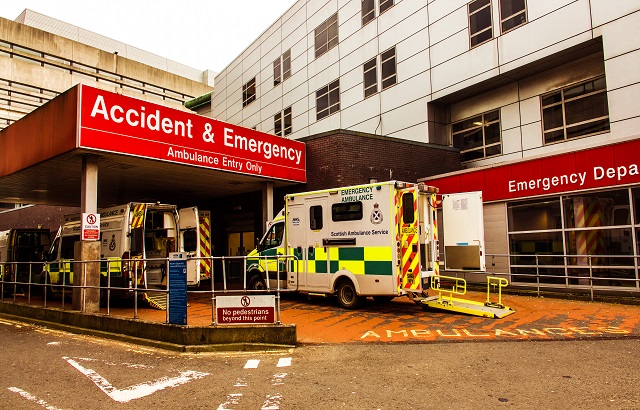

The head of the NHS has today launched a major new drive to persuade the public to seek the urgent care and treatment they need.

NHS chief executive Sir Simon Stevens warned that delays in getting treatment due to coronavirus fears pose a long term risk to people’s health.
Seeking medical help is one of the four reasons that people can safely leave home, in line with government guidance.
And Sir Simon stressed that the NHS is still there for patients without coronavirus who need urgent and emergency services for stroke, heart attack, and other killer conditions.
While NHS staff have worked hard to out in place measures allowing people to access care safely – such as splitting services into Covid and non-Covid – attendances at Accident and Emergency departments are so far on course to be one million lower this April than last.
Some leading clinicians including the Royal College of Paediatrics and Child Health and medical research charities such as us and Stroke Association have expressed concerns that people are risking their long-term health, and their lives, by delaying getting the help they need.
Your health matters
A new public information campaign – including digital adverts, posters and social media featuring NHS staff – will be rolled out next week to persuade people to contact their GP or the 111 service if they have urgent care needs – or 999 in emergencies - and to attend hospital if they are told they should.
As well as encouraging people to seek help for urgent health needs, over the coming weeks the NHS will take steps to encourage people to use other vital services - such as cancer screening and care, maternity appointments and mental health support – as they usually would, by demonstrating how frontline teams are delivering them safely.
NHS chief executive Sir Simon Stevens said: “NHS staff have pulled out all the stops to respond to the biggest global health threat in a century, while also ensuring that people can still access the urgent services they need in as safe a way as possible.
“That massive, coordinated effort has meant that at all times there has been more than enough beds and other treatment capacity available not just to ensure those with coronavirus get the care they need, but also everyone else who needs it too.
“But we know that worries about coronavirus, combined with not wanting to be a burden on NHS staff, has meant that some people haven’t come forward for care for themselves or their families when they would usually have done.
“This poses real risks to people’s long-term health, so our message to the public is clear: the NHS is still here for everyone who needs it, so help us help you, and get the care you need.”
Rapid response
As part of the NHS’ rapid response to the greatest public health challenge in its history, hospitals have freed up more than 33,000 beds, the equivalent of 50 new hospitals, over the last few weeks.
An unprecedented deal with the independent sector has put their 8,000 beds and 20,000 staff at the NHS’ disposal, and seven Nightingale hospitals have been rapidly set up around the country, providing over 3,500 more beds to help local hospitals ensure all those who need care can get it.
This significant increase in capacity, combined with effective social distancing by the public slowing the spread of the virus, has meant that the NHS has so far successfully been able to meet everyone’s need, with capacity to spare.
Over the coming weeks the NHS will be working with top doctors and nurses, as well as patient groups, to highlight how local health teams have adapted to the global coronavirus pandemic, and to reassure the public that it is safe to access care – including scheduled appointments, vaccinations and maternity services.
The NHS is ready
In April 2019 there were over 2.1million attendances at A&E departments in England; data published by Public Health England suggests that attendances over this month are around 50% lower.
The British Heart Foundation earlier in the month also reported a fall in 50 per cent in the number of people attending with heart attacks, raising concerns that people are not getting the potentially life-saving care that is still available.
Dr Sonya Babu-Narayan, our Associate Medical Director, said: "Whilst many things right now are uncertain, one thing that we can be certain of is that heart attacks kill. If people put off seeking urgent medical help when they are having heart attack symptoms they put their life at risk.
"Also vitally important are the many thousands of people in the UK living with existing heart conditions, like heart failure, who will also need to be able to access care immediately if their condition worsens.
"Our message is clear, do not delay seeking help. If you are experiencing symptoms of a heart attack call 999 immediately. If you have a heart condition which is getting worse don't delay in seeking medical advice and help. You are not a burden, the NHS remains ready to treat you."
OUR CORONAVIRUS HUB


